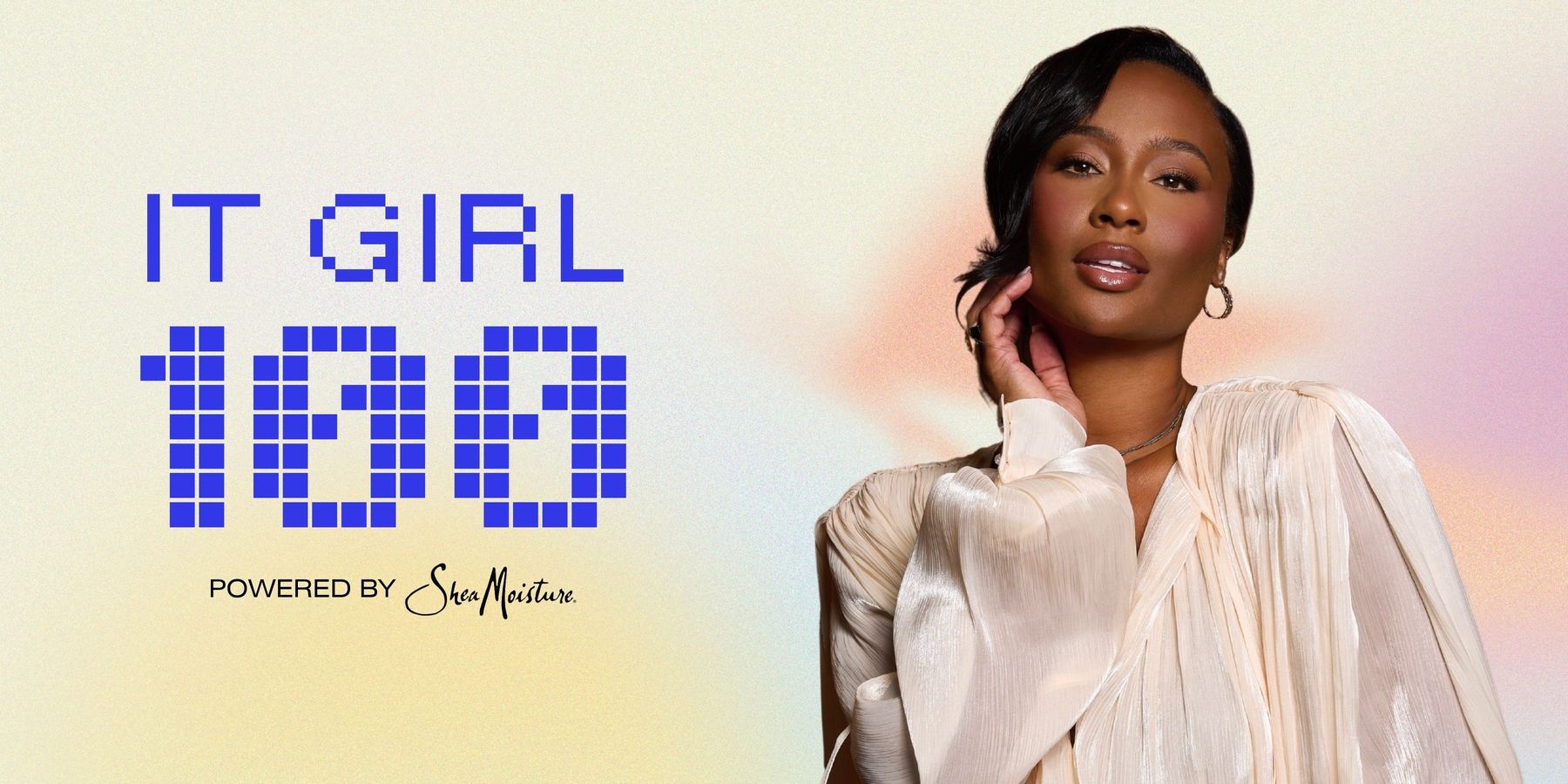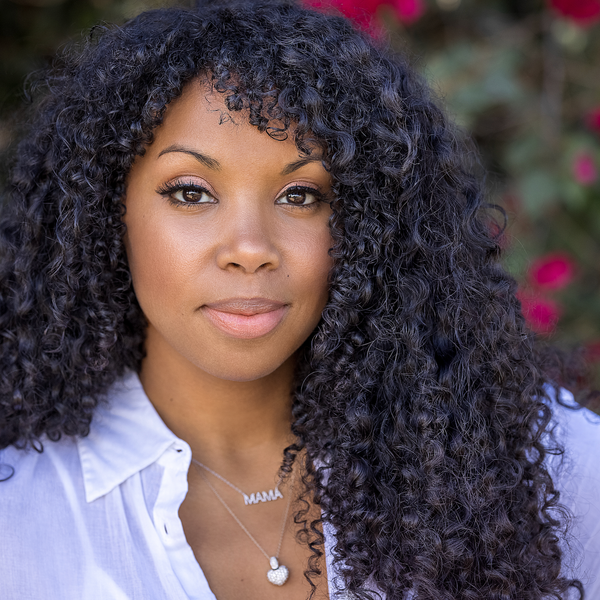
It’s the time of year that calls for deep reflection and even deeper self-inventory — and Codie Elaine Oliver, co-creator of the Black Love multi-verse, is feeling the effects, “I've been in this really deep place lately, so forgive me.” It’s a place that many of us have found ourselves in, after a pivot, a moment of self-discovery, or simply in the quiet moments of our day-to-day routines. It’s the light bulb that illuminates in our heart, almost blindingly, to reveal inward truths, “I've learned to recognize that I am tender and require tenderness from those in my life. I've learned to own it as opposed to [trying to] fit into the box of having thicker skin.”
For Codie, whose personal and work life are so intimately intertwined, these moments produce profound awareness, with lessons learned and applied both on and off the camera. In many ways, the Black Love docuseries is an extension of Codie’s lived experiences. The show’s honest portrayal of married life, the best and worst of it, was birthed out of her curiosity of “how to make it work,” stemming from her parent’s divorce when she was just 11 years old.
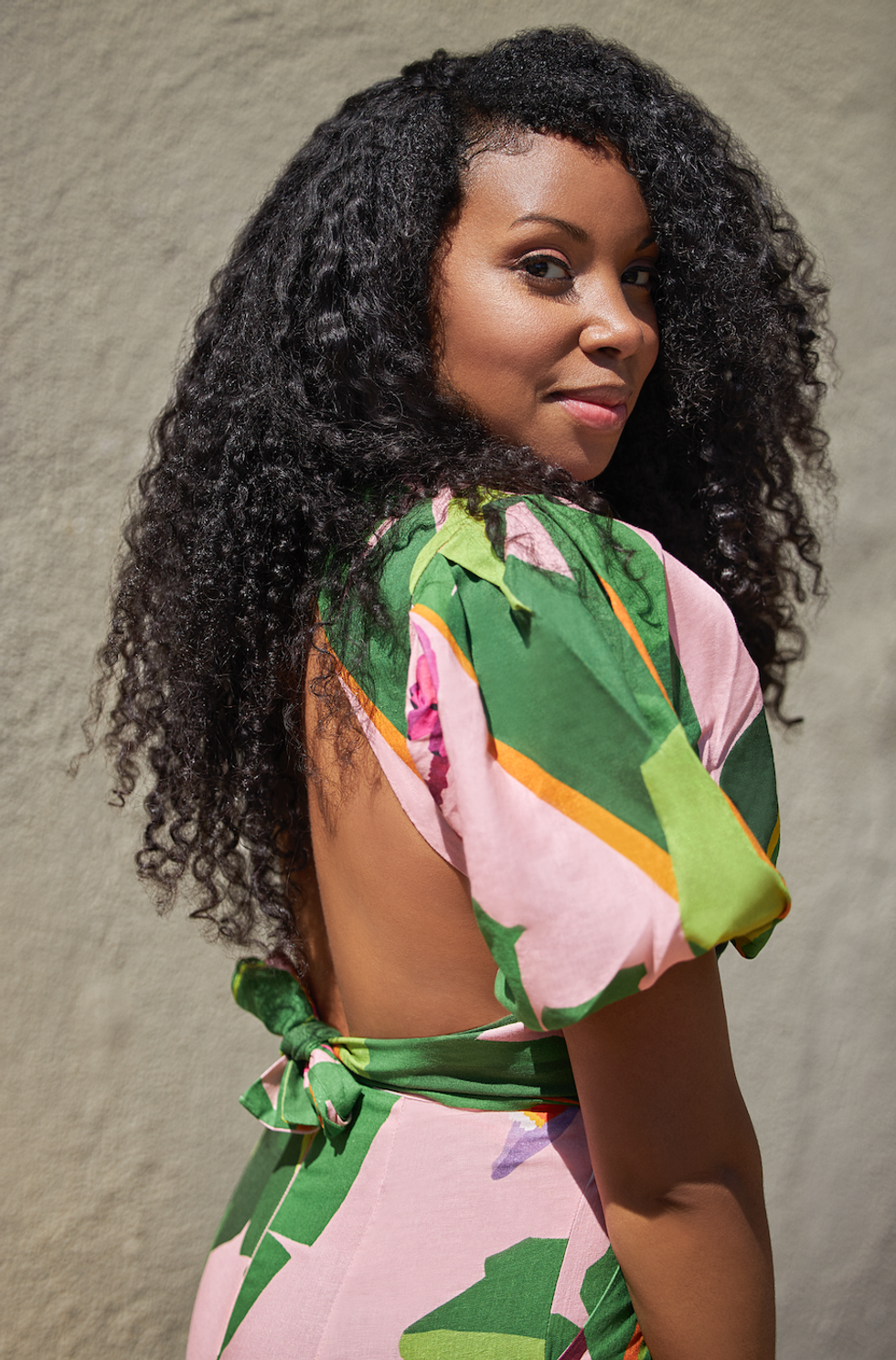
Photo Credit: Tommy Oliver
Into adulthood, Codie’s earnest allurement for all things love and relationships began to merge with her natural storytelling abilities. Crossed between opposing narratives of a “Black marriage crisis” and her own desires for partnership, Codie began to explore the possibility of her own Black love story, “People tell you the more degrees a Black woman has, the less likely you are to get married. I lived in LA and they tell you you can't meet anybody there,” she continues thoughtfully, “I felt like I could either accept that [marriage] was not going to happen or I could immerse myself in how possible it was.”
Instead of conceding to these disparaging narratives, Codie decided to tell a new story, thus creating the Black Love docuseries.
Cut to now, Codie, alongside her husband and co-creator, Tommy Oliver, have highlighted the journeys of over 250 couples through their docuseries, social platforms, and live events. Together, the couple is able to play off each other’s strengths; with Tommy administering the structure and Codie applying her nurturing essence to make space for transparent discourse to be exchanged and handled with care, “I love the behind the scenes, I love to bring people together. My personality makes it so that I bring authenticity and comfort out of others.”
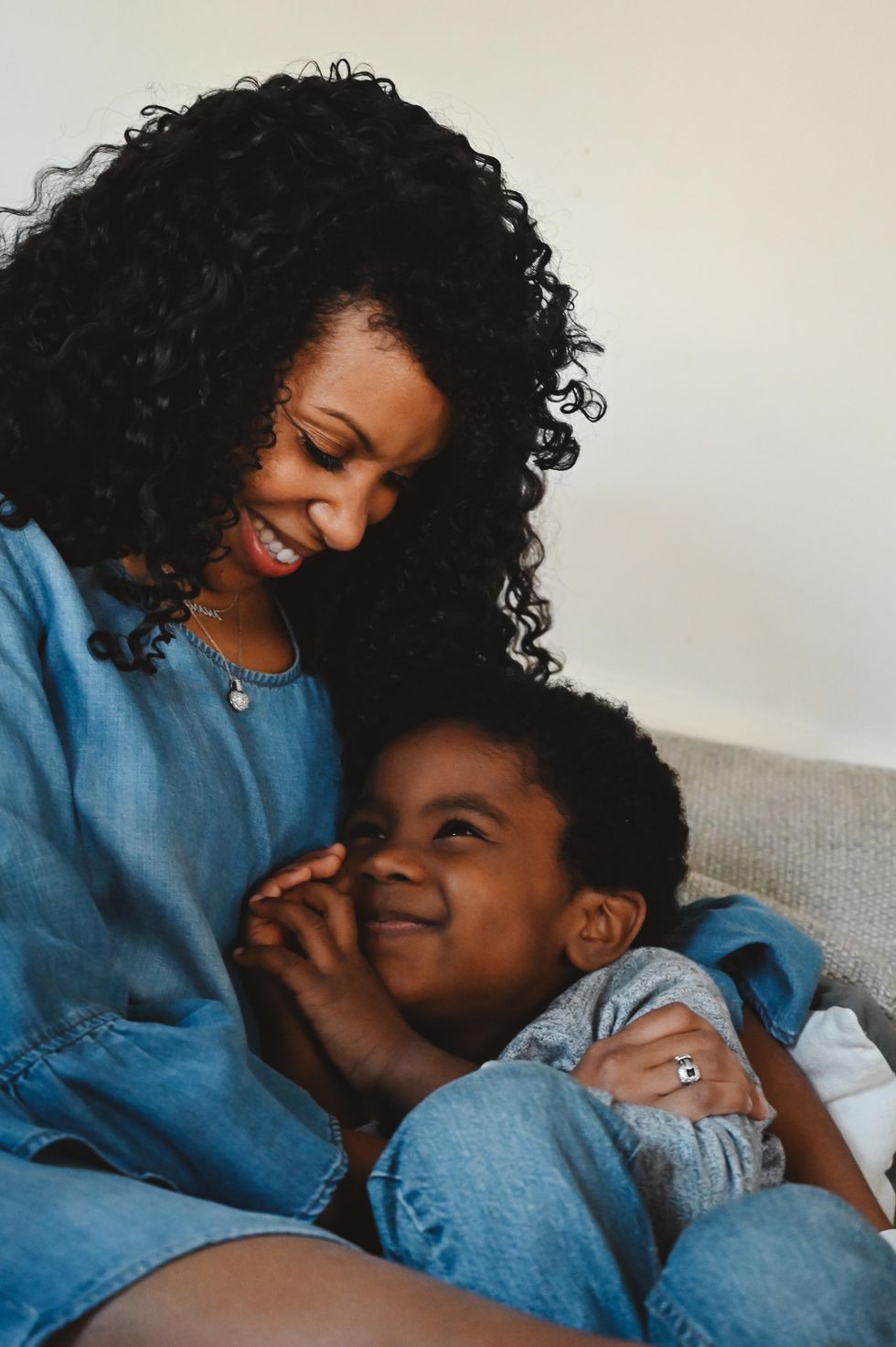
Photo Credit: Monkeys and Peas Photography
It’s this comfort and authenticity that has, in itself, restored the hope and possibility for love in countless hearts. This points to a legacy that has not only beared fruit in her lifetime but has also planted seeds in her children to carry forward. Or as Codie shares, “the editor of Black Love, Christopher Scott Shapiro, always says, ‘Yes! Keep raising those boys with this trauma-free Blackness.’”
Knowing that you had something special with your docuseries, what were the initial steps to get in the right rooms to pitch your series to networks and eventually OWN Network?
Codie Elaine Oliver: I would say the confidence came from the fact that I just knew that I needed it, I knew my friends needed it, and I knew that I'd never seen it before. I knew there was a hole right in the “market.” That's what kept me going.
When my husband and I started this project, it was meant to be a documentary. So we went the traditional route with an independent documentary and our expectation was to raise a little money or crowdfund, to go to film festivals or maybe in theaters. But it was an independent job and there's an end date or shelf life. When we pivoted from the traditional route, we were met with a lot of pushback. A lot of white [executives] were asking questions like, is that it? What else? People had a lot of questions about traditional documentary storytelling and what we really needed, but we felt like hearing from the couple would satisfy the goal.
Tommy and I decided to make it as “foolproof” as possible; an "inevitable yes" as he would put it. We shot for two years, from 2014 to 2016, edited the first episode, wrote a treatment for the entire season, and did a sizzle for the full season. That gave potential buyers a really clear picture of what this was, the structure, what it felt like. That's how we got around the traditional structure because it's unlikely that we would have gotten it made off of a pitch and no actual video.
What have you learned overall about turning your pain points into purpose?
For me, leaning into the big questions that I've had in my life, my uncertainties, and the things that made me uncomfortable, allowed me to learn about myself and the people around me. A friend of mine recently said, “Trauma is not what happens to you, it's what happens within you.” When I think about people's trauma, I think most of us have had scenarios that may seem small to someone else, but what matters is what happens within us. When I’ve leaned into those experiences, to ask myself questions and seek answers, it’s helped me be a better person, professional, wife, and mother. And my hope is that leaning into those uncomfortable places helps others as well.
"When I’ve leaned into those experiences, to ask myself questions and seek answers, it’s helped me be a better person, professional, wife, and mother. And my hope is that leaning into those uncomfortable places helps others as well."
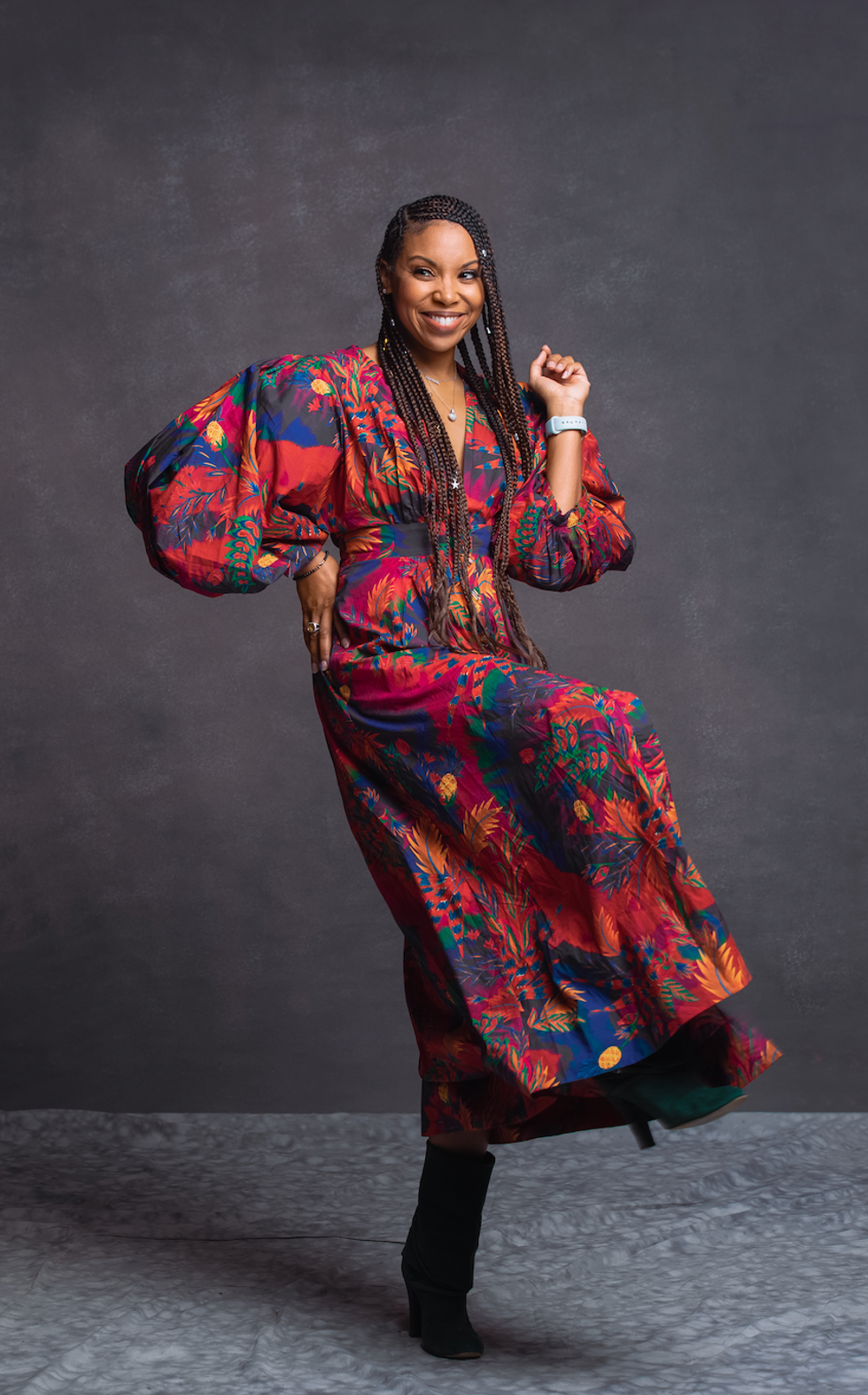
Photo Credit: James Anthony
They say relationships are like holding a mirror up to yourself. What have you personally learned about yourself through the work that you do along with co-creating with your husband?
Oh, so many things. I'm learning about myself every day. I'm learning about partnership and marriage. I'm learning about what I was always dying to know: which is what it takes to make a marriage work — and I'm learning that through our couples. The show is more than a show for us. Every time we sit down and interview a couple, it's not like we're shooting a TV show, that's not what it feels like in the room. Every time we spend time with a couple, it is an opportunity for us to learn and grow.
For me, the Black Love docu-series is this exciting and sometimes painful therapy. I'm constantly learning, but my greatest lessons have come in the form of seeking balance and peace in my life, amid the blessing of having a business that is my purpose and my passion and having a family.
You mentioned early in our conversation that you’re in a “deep place” right now. What has this time taught you about yourself?
I’ve learned that I have to set boundaries to protect my mental health. Sometimes those boundaries come in the form of difficult business decisions, canceling something, delegating things that I may be afraid to delegate.
I've also learned that I need to treat my mind and body better and speak to them more positively; feed them better, both in terms of literal food and through meditation and movement. These things are key to my personal and professional success. Too often we run all of those things into the ground: our bodies, our minds, our boundaries, our softness, to try to check boxes and meet deadlines. But it's very important to consider when and why to actually sacrifice yourself for something.
“Too often we run all of those things into the ground: our bodies, our minds, our boundaries, our softness, to try to check boxes and meet deadlines. But it's very important to consider when and why to actually sacrifice yourself for something.”
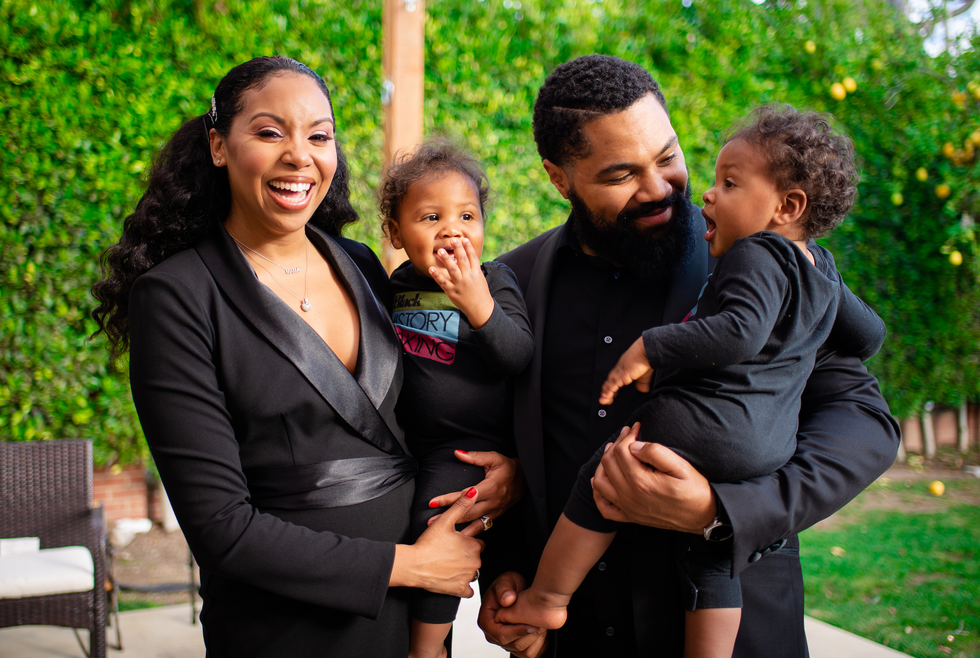
Photo Credit: Breanna Jones
What is your perspective on carrying down generational wealth through love? To your children, tribe, and community?
My biggest goal and passion — and the place where I get simultaneously excited and emotional, is passing that radical self-love to my children in every way. How can I make sure they love themselves so much so that no one can tell them they aren't good enough or attractive enough. I want them to laugh at anyone who thinks that they are not beautiful. That's one of the places where I think we have the greatest responsibility as people because our kids are looking at us. And not just the ones that come out of us; the kids are looking at us. That's where we have the responsibility to really pour into them.
The outside world is going to do what the outside world does, but how can we inflict the least amount of trauma onto our children? Where they simply love each other, and themselves deeply.
You were a 20-something navigating your career and balancing your love life all at the same time. What advice would you give to 20- and 30-something Black women who desire to have a career and family?
I would want to do away with the words, “have it all.” Or at least encourage everyone to define that for themselves and to listen to themselves as they grow and change because you don't really know what “having it all” means or what it looks like until you're juggling it all. I could not fathom what those words meant 10, 15, 20 years ago, when I was still at home, looking at grown-ups, like, “Oh, she has it all right.”
Thankfully, for our generation and those coming after me, we've become more inquisitive. We've become more thoughtful and transparent. We seek authentic candor from one another and from our parents and grandparents, we're asking questions. I hope that the notion of having it all becomes something that we discuss and question earlier; that's my biggest advice.
“Because having it all doesn't mean that I'm happy. Looking at these women that we look up to, what did they sacrifice? What is their self-care ritual? Those are the things I think about. If I can't take a 15-minute walk every day, if I can't feed myself and my soul the way that I deserve, it doesn't matter.”
I wish I could quote Tai Beauchamp, she shared something to the effect of, “It changes depending on the season, but the goal is to be able to do things that you love and still have like peace within yourself,” and that is pretty much the definition that I've adopted. Because having it all doesn't mean that I'm happy. Looking at these women that we look up to, what did they sacrifice? What is their self-care ritual? Does it exist? Those are the things I think about.
If I can't take a 15-minute walk every day, if I can't feed myself and my soul the way that I deserve, it doesn't matter.
Find out more about Codie Elaine Oliver via her Instagram and podcast. And for all things Black Love-related, follow the platform on YouTube and Instagram.
Featured image courtesy of Codie Elaine Oliver
Exclusive: Viral It Girl Kayla Nicole Is Reclaiming The Mic—And The Narrative
It’s nice to have a podcast when you’re constantly trending online. One week after setting timelines ablaze on Halloween, Kayla Nicole released an episode of her Dear Media pop culture podcast, The Pre-Game, where she took listeners behind the scenes of her viral costume.
The 34-year-old had been torn between dressing up as Beyoncé or Toni Braxton, she says in the episode. She couldn’t decide which version of Bey she’d be, though. Two days before the holiday, she locked in her choice, filming a short recreation of Braxton’s “He Wasn’t Man Enough for Me” music video that has since garnered nearly 6.5M views on TikTok.
Kayla Nicole says she wore a dress that was once worn by Braxton herself for the Halloween costume. “It’s not a secret Toni is more on the petite side. I’m obsessed with all 5’2” of her,” she tells xoNecole via email. “But I’m 5’10'' and not missing any meals, honey, so to my surprise, when I got the dress and it actually fit, I knew it was destiny.”
The episode was the perfect way for the multihyphenate to take control of her own narrative. By addressing the viral moment on her own platform, she was able to stir the conversation and keep the focus on her adoration for Braxton, an artist she says she grew up listening to and who still makes her most-played playlist every year. Elsewhere, she likely would’ve received questions about whether or not the costume was a subliminal aimed at her ex-boyfriend and his pop star fiancée. “I think that people will try to project their own narratives, right?” she said, hinting at this in the episode. “But, for me personally – I think it’s very important to say this in this moment – I’m not in the business of tearing other women down. I’m in the business of celebrating them.”
Kayla Nicole is among xoNecole’s It Girl 100 Class of 2025, powered by SheaMoisture, recognized in the Viral Voices category for her work in media and the trends she sets on our timelines, all while prioritizing her own mental and physical health. As she puts it: “Yes, I’m curating conversations on my podcast The Pre-Game, and cultivating community with my wellness brand Tribe Therepē.”
Despite being the frequent topic of conversation online, Kayla Nicole says she’s learning to take advantage of her growing social media platform without becoming consumed by it. “I refuse to let the internet consume me. It’s supposed to be a resource and tool for connection, so if it becomes anything beyond that I will log out,” she says.
On The Pre-Game, which launched earlier this year, she has positioned herself as listeners “homegirl.” “There’s definitely a delicate dance between being genuine and oversharing, and I’ve had to learn that the hard way. Now I share from a place of reflection, not reaction,” she says. “If it can help someone feel seen or less alone, I’ll talk about it within reason. But I’ve certainly learned to protect parts of my life that I cherish most. I share what serves connection but doesn’t cost me peace.
"I refuse to let the internet consume me. It’s supposed to be a resource and tool for connection, so if it becomes anything beyond that I will log out."

Credit: Malcolm Roberson
Throughout each episode, she sips a cocktail and addresses trending topics (even when they involve herself). It’s a platform the Pepperdine University alumnus has been preparing to have since she graduated with a degree in broadcast journalism, with a concentration in political science.
“I just knew I was going to end up on a local news network at the head anchor table, breaking high speed chases, and tossing it to the weather girl,” she says. Instead, she ended up working as an assistant at TMZ before covering sports as a freelance reporter. (She’s said she didn’t work for ESPN, despite previous reports saying otherwise.) The Pre-Game combines her love for pop culture and sports in a way that once felt inaccessible to her in traditional media.
She’s not just a podcaster, though. When she’s not behind the mic, taking acting classes or making her New York Fashion Week debut, Kayla Nicole is also busy elevating her wellness brand Tribe Therepē, where she shares her workouts and the workout equipment that helps her look chic while staying fit. She says the brand will add apparel to its line up in early 2026.
“Tribe Therepē has evolved into exactly what I have always envisioned. A community of women who care about being fit not just for the aesthetic, but for their mental and emotional well-being too. It’s grounded. It’s feminine. It’s strong,” she says. “And honestly, it's a reflection of where I am in my life right now. I feel so damn good - mentally, emotionally, and physically. And I am grateful to be in a space where I can pour that love and light back into the community that continues to pour into me.”
Tap into the full It Girl 100 Class of 2025 and meet all the women changing game this year and beyond. See the full list here.
Featured image by Malcolm Roberson
More Than Gratitude: 7 Signs You're Struggling With Contentment In Your Life
If Thanksgiving happens to be your favorite holiday — or you just happen to be a longstanding participant of it — then there is one tradition that you are probably familiar with. Usually, before everyone eats, each individual expresses at least one thing that they are grateful for. I actually think that is one of the best things about the holiday because it reminds people to slow down and really reflect on how to be in the moment and think about the blessings that they have. And that, my friend, is what gets folks into the mindset of knowing how to be…content — even if it’s just for a brief moment.
Contentment. By definition, it’s the state of not only being “satisfied with what one is or has” but also “not wanting more or anything else.” And you know what? Although it might not be a popular aspiration of many, it is a sign of spiritual maturity on certain levels. After all, it is the Apostle Paul who once said, “Not that I speak in regard to need, for I have learned in whatever state I am, to be content…” (Philippians 4:19 — NKJV).
Being content is about not complaining. Being content is about learning to be comfortable in your present circumstances. Being content is about choosing to find joy and fulfillment, on some level, and in some way, on a daily basis.
Personally, I dig all of this so much because when you have mastered true inner contentment, it creates stability, self-awareness, and a type of resilience that makes you…shoot, powerful beyond measure, if you ask me. Because when someone knows how to “find the good” and “make peace,” regardless of what is going on around them, they truly are unstoppable. Yeah, on so many levels, contentment is the ultimate life hack. It’s something that each and every one of us should aspire to become: completely and genuinely content.
Thanksgiving is basically moments away at this point. In preparation for that time of self-reflection, pour yourself a glass of wine, turn on some soft music, sit on your coach, and then ask yourself, “Am I content?” If you’re not sure (or you need the definition unpacked for you just a bit more), here are seven signs that you may not be…and yet, there is no time like the present to do something about it.
1. You’re Super Impatient
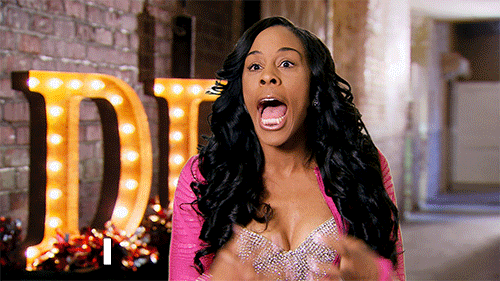 Giphy
GiphyHonestly, putting another Scripture right here could be all that is needed in order to bring this point to a swift and abrupt end. Which one? I Corinthians 13, the Love Chapter, starts off with “Love is patient” (I Corinthians 13:4). Yeah, if you want to know if you love yourself and love yourself well, how patient are you…including with yourself? Throughout the years, I have shared one of my favorite definitions of "patient" in several different articles: “bearing provocation, annoyance, misfortune, delay, hardship, pain, etc., with fortitude and calm and without complaint, anger, or the like.” For me, it’s a blaring reminder that mastering patience isn’t just about waiting (more on that in a sec); it’s about waiting with grace.
Content people can do this because, on some level, they know how to apply the John Piper quote, "God is always doing 10,000 things in your life, and you may be aware of three of them." Another way of looking at this is people who can wait well — without complaining or getting annoyed by delays or challenges in the meantime — get that in order for things to truly come together, there are lots of moving parts…some that they don’t even know about. And so, if they want the best outcome, yes, waiting well is oftentimes not just involved; it is required.
Impatient people don’t get any of this. That’s why they are so stressed out all of the time.
2. You’re Worried About Things You Can’t Control
 Giphy
GiphyThis. Past. Election. Chile. And then the cabinet that that man is putting together as we speak? I don’t even want to get my blood pressure up, expounding on it. Let me just pivot by adding one more Scripture — because it is beyond fitting: “Therefore do not worry about tomorrow, for tomorrow will worry about its own things. Sufficient for the day is its own trouble.” (Matthew 6:34 — NKJV)
Although worrying is something that pretty much everyone does at one point or another, one of my favorite quotes on it is by an American humorist by the name of Erma Bombeck: “Worry is like a rocking chair: it gives you something to do but never gets you anywhere.” And really, when you stop to really think about worrying, isn’t that the truth? For one thing, all worrying does, by definition, is cause you to torment yourself by focusing on things that aren’t even going to happen (somewhere between 85-90 percent of the time, in fact; there is actually a science on that) or trying to control things that are beyond your control.
If being a worry wart is your internal struggle, my advice would be to look at life this way: If you’re worried that you’re about to get written up for getting to work late again, leave your house earlier — you can control that. On the other hand, if you’re worried that you’re going to get laid off before the holiday season ends, so long as you’ve been doing your best (which is also something that you can control), please put your energy elsewhere because that is something that you can’t control.
And I promise that when you choose to be calm and confident over worrying yourself to death, that can help you to manage what you can’t control so much easier. Oh, and your health will thank you, too, because worry is attached to things like insomnia, muscle tension, headaches, overeating, and drinking too much. All this over things that probably won’t happen in the first place? Yeah, sis…(choose to) relax.
And by choosing to chill out, there is some contentment that follows because you will see the good as much as, if not more than, the potential bad. Trust me.
3. The Past and/or Future Consume You
 Giphy
GiphyOn the heels of the Scripture that I just provided for the previous point, it also applies to this one. You know, back when I was doing some intentional research on forgiveness, I always appreciated the insight of author Gary Zukav: “Forgiveness is accepting that the past cannot change.” While this doesn’t mean that you shouldn’t hold people accountable for what they have done, it does help you to be compassionate with those who are truly sorry (check out “Heads Up: It's NOT An Apology If An Amend Isn't Made”) because, no matter what has transpired between you and them, one thing they can’t do is go back into a time machine and change it.
And you know what? When it comes to the mistakes — or, let’s be real, sometimes they are conscious poor decisions — you have made, you can’t either. So, why let their misdeeds or your own consume you to the point of internally destroying you?
Then there’s the future. What if you get robbed? What if your mom gets cancer? What if your husband files for divorce? Girl, if you are caught up in the future that hasn’t even happened yet, you are definitely gonna drive yourself up the wall! And this is why so many mental health experts and platforms are all about encouraging individuals to live in the moment. You can do this by meditating, taking breaks from social media (and the news), journaling, doing things that you enjoy (instead of waiting to put them off), and resting.
Listen, one of the best things about choosing to only focus on the here and now is you can find little things about it to be content with — and that helps you to be/become more content overall.
4. You Always Think About Wanting More
 Giphy
GiphyAlthough it certainly wasn’t my plan for this piece to be so Scripture-heavy, I’ve got to flow with what immediately comes to mind and, for this point, the verse, “So are the ways of everyone who is greedy for gain; It takes away the life of its owners” (Proverbs 1:19 — NKJV) is it. And just what does it mean to be greedy? A greedy individual isn’t just low-key obsessed with getting and having more — please catch it — they are also quite EAGER.
Eager folks also tend to be impatient. Eager folks are perceived by others as being very intense (and not in a good way). More times than not, eager folks haven’t really mastered how to take a moment to appreciate what they do have because all they care about is what’s next. And when you’re in a state of that kind of, well, anxiety…how could it not affect your quality of life? I mean, really.
And what if you read all of that and said, “I’m not greedy; I’m just ambitious” — listen, there is nothing wrong with having goals and wanting to obtain them. However, an ambitious individual knows how to find balance. If they get a promotion, they will schedule a vacation to celebrate it. If they just got a new car, they are not in a rush to get a new house until they can financially afford it. If they were just proposed to with a really nice ring, they aren’t hounding their new fiancé about setting a date within the next two weeks.
People who always want more, without taking the time to enjoy what they already have, are never going to be content. Why? Because there is always something else that you can want…even if you don’t need it or it really isn’t the time for it. Meanwhile, content people get that it’s a good thing to not go after everything all of the time; that it’s far wiser to embrace what is already before them — because some folks don’t even have…that.
5. You Compare Yourself to Others
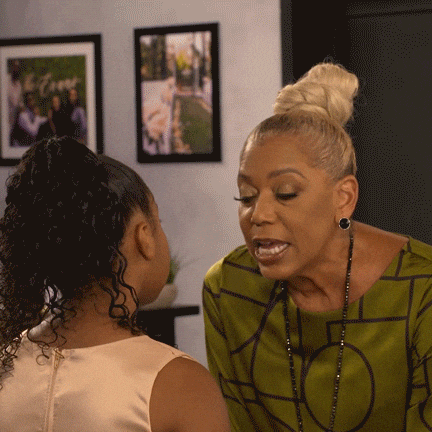 Giphy
GiphySomething that I actually get asked fairly often is, do I feel “some type of way” that I do so much work in the realm of marriage when I’ve never been married myself. The short answer is “absolutely not” because I know that I could’ve been married, a few times over, at this point; however, I am just as intentional about not wanting to be divorced as I am about being in a healthy marriage, not just “a marriage.”
I’m grateful to be in that head and heart space too; otherwise, I would be out here comparing myself to other people — and there is nothing good, healthy, wise, profitable, or beneficial about doing that. In fact, science isn’t a fan of playing the “keeping up with the Joneses” game, either.
According to science, that can ultimately do things like lower your self-esteem, cause you to only see the bad/negative things in your world (in comparison to other people), and it can jack up your perception of what’s really going on with other people. For instance, if you’re 33 and comparing yourself to your friends who are already married and parents, you might want to talk to them about what their day-to-day, beyond their IG posts, is like.
Because while prayerfully, their life is filled with many blessings, if they are being totally honest with you, they will also share that you’ve got some “pros” to your life too (honey, there are some real benefits to being single; check out “If You're Not In Love With Being Single, Ask Yourself These 6 Questions.,” “10 Bona Fide Benefits Of Being Single,” and “10 Words That'll Make You Totally Rethink The Word 'Single'”). Content people get that every season does — because it’s true.
6. You Don’t Verbalize Gratitude Often
 Giphy
GiphyThere is someone in my world who I actually try to avoid as much as possible. It’s not that she’s not smart, and honestly, she’s one of the funniest individuals that I’ve ever known (and I’ve known her for most of my adult life). It’s just that…she is always wanting something, and I find that to make her a very draining individual. Lawd, even as I am typing all of this out, I’m trying to recall a time when I’ve heard her say, “thank you” for something (no joke), let alone express any form of genuine gratitude. She’s just got such a sense of entitlement that whatever she does receive, she thinks she’s owed and what she doesn’t have, she believes that something is wrong if it hasn’t arrived yet. Geeze, what a horrible type of existence.
You don’t have to take my word for it either because there is plenty of data out here to support that people who don’t take the time to be grateful for what they have ended up being unhappy, more stressed out, in more physical pain (yes, literally) and definitely more negative than everyone else — which would explain why people don’t like hanging out with them as much.
So, since this is the time when gratitude is the theme of the season, think about what you are grateful for when it comes to what you’ve accomplished this year, then write it down and post it up somewhere. Then, as far as the individuals, for whom you are grateful for — send them a handwritten note, get them a gift card to their favorite coffee shop, or even just call to tell them.
One of the most beautiful things about being in a state of contentment is it reminds you of a lot of what you already have. It really is enough…for now…in this very moment.
7. Being (and Living) Satisfied Is a Foreign Concept to You
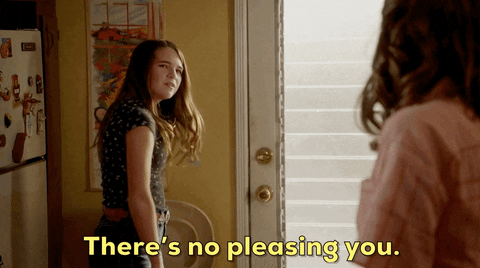 Giphy
Giphy“Tubi movies” really is a complete sentence. LOL. And yes, sometimes, when I’m taking a writing break, I will check out some of the most…I-wouldn’t-normally ones, just to lend my support. In walks Never Satisfied with its own self-explanatory meaning. Y’all, it really is oh so true that there are folks out here dealing with some unpredictable and sometimes even truly dire consequences — and it’s all because they didn’t know how to sit down somewhere and learn how to be satisfied with the people, places, things, and ideas that they already have.
That said, I am indeed a quotes gal, and one of my favorites on the topic of satisfaction is by actor Christopher Reeve: “Success is finding satisfaction in giving a little more than you take,” and although I don’t do what I’m about to do often (because I try to take Matthew 6:1-4 very literally and seriously), I’m going to illustrate what he said about satisfaction by sharing a recent situation.
This past week, a nurse practitioner (I prefer those to doctors) diagnosed me with wrist tendonitis for the first time in my life. If you knew how many keystrokes that I do a day, you’d probably be shocked that it took this long. Anyway, as I was waiting in line to get a prescription, a young Black man was basically freaking out because his insurance was refusing to cover his own meds. According to what he was telling the pharmacist, he always only pays $5; however, this time, they were charging $62, he simply didn’t have it, and the insurance company was not picking up.
As I watched him shaking and sweating while saying that he really needed it today and fretting while talking to his mom on the phone, I offered to cover it — and after going back and forth with him for about three minutes, I did. In my mind, although I didn’t plan on spending about $85 (total) that day, the little inconvenience that it was costing me was nothing in comparison to how much it was going to benefit him — I could tell from how he and his mother reacted (even the pharmacist mouthed “thank you so much”), and that is what made it money well spent.
To help someone who had no way of helping themselves in the moment? That brought me a lot of satisfaction because it’s nice to lighten someone’s load while leaving it to karma to handle it. ALL OF IT.
And that’s why I thought it was best to wrap all of this up with a reminder that being satisfied is being content. And when you can be so satisfied with your life that you want to help others? That is a level of contentment that is truly unmatched because you start looking for ways to bless others simply so that they can feel just as content as you do.
____
Our culture? It really is never satisfied, which explains why a lot of people are so miserable. SMDH. You don’t have to be like the masses, though. This Thanksgiving, please purpose in your mind (and heart) to be(come) more content. It will make you a rare gem that benefits everyone and everything around you.
Including yourself, sis. No doubt about it.
Let’s make things inbox official! Sign up for the xoNecole newsletter for love, wellness, career, and exclusive content delivered straight to your inbox.
Featured image by Shutterstock
Originally published on November 28, 2024








